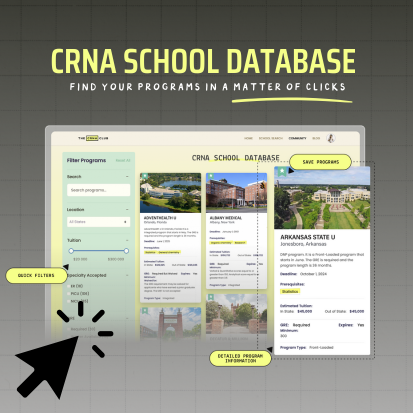Grab this free download of 75 CRNA school interview questions!
Preparing for your CRNA school interview can feel daunting, especially when programs use emotional intelligence (EQ) questions to assess how you handle stress, work with teams, and navigate ethical dilemmas. These questions go beyond your resume to see if you have the essential traits to succeed as a Certified Registered Nurse Anesthetist (CRNA).
In this post, we’ll dive into common emotional intelligence CRNA school interview questions and how you can approach answering them with avoiding some common mistakes – it can be tricky!
If we haven’t met yet, I’m Sachi, founder of THE CRNA CLUB – your go to resources for helpful tools for your CRNA school acceptance journey. Give us a follow on Instagram @thecrnaclub!
Why CRNA Programs Ask Emotional intelligence Questions
1. They need to know who you are beyond your resume
CRNA programs aren’t just interested in your clinical experience—they want to see if you have the emotional resilience required for the high-pressure world of anesthesia. EQ questions help admissions committees evaluate how you manage stress, solve problems, and collaborate effectively with others.
Pro Tip: When preparing for your interview, focus on how you’ve demonstrated traits like stress management and adaptability in real-life situations.
2. Are You a Good Fit for their program?
EQ questions also help schools determine if you’ll fit well with their cohort and the intense nature of CRNA training. Your answers will show whether you’re ready to meet the demands of both the program and the profession.
Common Emotional intelligence Questions and How to Shine
1. Why do you want to be a CRNA?
This is your chance to go beyond a generic response. Talk about the unique experiences that drew you to nurse anesthesia, whether it was shadowing CRNAs or caring for specific patient populations. Show your passion for the profession by highlighting your interest in autonomy, research, or advanced patient care.
2. Tell Me About a Stressful Situation. How Did You Handle It?
Admissions committees want to see how you cope under pressure. Choose a story that showcases healthy coping mechanisms like exercise or hobbies, and emphasize your perseverance and grit. Avoid mentioning negative coping habits, like alcohol, and instead focus on your ability to stay calm and resilient.
3. Describe a Mistake You Made
Honesty is key here. Share a story where you made a mistake, but focus on how you grew from the experience. Did you take extra training or improve your communication skills to prevent similar issues in the future? Admissions teams want to see accountability and growth.
4. Tell Me About a Conflict with a Superior
Use this question to highlight your conflict resolution and advocacy skills. Show how you advocated for a patient while maintaining professionalism and resolving the conflict in a positive way. CRNA programs value strong communication, so this is your chance to shine.
5. What Are Your Weaknesses?
Be honest, but show self-awareness. Identify a real weakness and explain how you’re actively working to improve it. For example, you might say, “I sometimes struggle with time management, so I’ve implemented tools like task prioritization and planning to stay on top of my work.”
The Power of Storytelling in CRNA Interviews
When answering EQ questions, storytelling can be your secret weapon. Prepare stories that showcase key traits like:
- Perseverance
- Stress management
- Conflict resolution
- Leadership
These stories will make your responses more engaging and help you stand out from other applicants. Plus, stories are memorable, ensuring you leave a lasting impression on the interview panel.
We have extensive CRNA school interview prep inside of our Learning Library in The CRNA Club Membership. We even have lectures from faculty! Check it out here.



